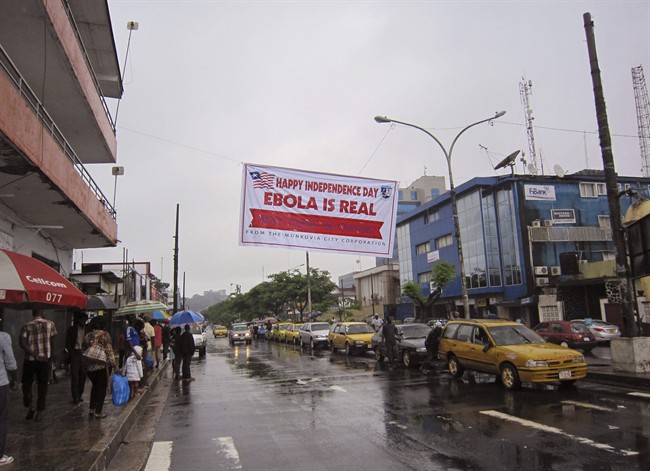MONROVIA, Liberia – Police officers deployed to Liberia’s international airport to ensure passengers are screened for Ebola symptoms as a major regional airline announced Tuesday it was suspending flights to the cities hardest hit by an outbreak that has killed more than 670 people.

A 40-year-old American man of Liberian descent who worked for the West African nation’s Finance Ministry died Friday in Nigeria after taking several flights on ASKY Airlines. At the time, Liberian authorities said they had not been requiring health checks of departing passengers in Monrovia.
“We have a presence of the police at the airport to enforce what we’re doing,” said Binyah Kesselly, chairman of the Liberia Airport Authority board. “So if you have a flight and you are not complying with the rules, we will not allow you to board.”
READ MORE: 2 Americans contract Ebola while fighting deadly disease in Liberia
Patrick Sawyer’s sister had died of Ebola though he maintained he had not had close physical contact with her when she was sick. He took an ASKY Airlines flight from Liberia to Ghana, then on to Togo and eventually to Nigeria where he was immediately taken into quarantine until his death Friday.
His travels have caused widespread fear at a time when the outbreak shows no signs of slowing in West Africa, where medical facilities are scarce and where some affected communities have in panic attacked the international health workers trying to help them. The Ebola outbreak has had about a 70 per cent fatality rate, and there is no vaccine or specific treatment that can save lives.
READ MORE: 5 things to know about the Ebola outbreak in West Africa
In a statement released Tuesday, ASKY said it was temporarily halting flights not only to Monrovia but also to Freetown, Sierra Leone. Flights will continue to the capital of the third major country where people have died – Guinea – though passengers departing from there will be “screened for signs of the virus.”
- Naloxone-resistant street drug linked to 9 deaths in Eastern Canada seized in Alberta
- ‘She gets to be 10’: Ontario child’s heart donated to girl the same age
- Buzz kill? Gen Z less interested in coffee than older Canadians, survey shows
- Bird flu risk to humans an ‘enormous concern,’ WHO says. Here’s what to know
Passengers at the airline’s hub in Lome, Togo also will be screened by medical teams, it said.
“ASKY is determined to keep its passengers and staff safe during this unsettling time,” the statement said.
The World Health Organization says the risk of travellers contracting Ebola is considered low because it requires direct contact with bodily fluids or secretions such as urine, blood, sweat or saliva, experts say. Ebola can’t be spread like flu through casual contact or breathing in the same air.
Patients are contagious only once the disease has progressed to the point they show symptoms, according to the WHO. And the most vulnerable are health care workers and relatives who come in much closer contact with the sick. Among those currently hospitalized with Ebola in Liberia are two American health workers.
Still, the early symptoms of Ebola – fever, aches and sore throat – mirror many other diseases including malaria and typhoid, experts say. Only in later stages of Ebola do patients sometimes experience severe internal bleeding and blood coming out of their mouth, eyes or ears.
At the Finance Ministry where Sawyer worked, officials announced they were temporarily shutting down operations. All employees who came into contact with Sawyer before he left for Nigeria were being placed under surveillance, it said.
Despite the heightened precautions and reassurances from health workers, many Liberians said they were still fearful of contracting Ebola through casual contact.
Sam Mitchell who runs Sam’s Barbeque, Monrovia’s most popular fast food centre, has issued gloves to his workers and they are to wash their hands with chlorinated water before dealing with customers,
Garmie Gayflor, a hotel waitress, said that poverty was undermining the fight in her country.
“One does not have a car, and they say sweat from one affected person affects the others,” she said. “We have six to seven person riding in the back of a taxi or bus.”
—
Larson reported from Dakar, Senegal. Associated Press writer Erick Kaglan in Lome, Togo contributed to this report.

Comments